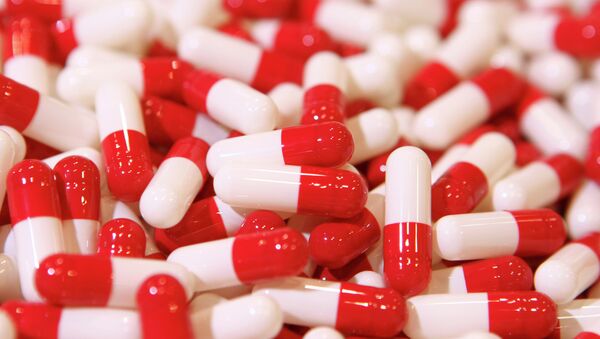Another day, another poisonous dietary supplement.
On November 17, the US Food and Drug Administration issued a recall notice for dophilus powder, made by a company called Solgar, Inc. Dophilus is a probiotic supplement: capsules filled with “good bacteria” that are supposedly capable of surviving the harsh, acidic environment of the stomach. These bacteria are then said to travel to the intestinal tract, where they provide protection against “bad” disease-causing bacteria.
Unwanted Fungal Guest
However, a batch of Solgar dophilus powder manufactured recently has an unwanted guest: a fungus called Rhizopus oryzae that lives in dead organic matter. Rhizopus oryzae can cause a disease called mucormycosis — an infection that can spread to the lungs, sinuses, eyes, face and the central nervous system. In rare cases, infected tissue has to be surgically removed.
So how did a potentially deadly fungus end up in a supplement that’s supposed to improve your health? The answer lies in the way these supplements are regulated — or, more accurately, in the way they are not regulated at all.
Supplements Market Worth Billions
One of the fastest-growing industries on the planet right now is for vitamins, minerals and supplements (VMS). According to the Nutritional Business Journal, the supplement market alone was worth $32 billion in 2013, on its way to topping an estimated $60 billion in revenue in 2021. As little as a decade ago, supplements were seen as a niche market for bodybuilders and health nuts. But savvy marketing — including partnerships with highly-visible brands like UFC — has caused the VMS sector to explode, especially amongst women.
A study released in 2006 shows supplement use amongst US adults shot up since the DSHEA was enacted in 1994. From 1988 until 1994, about 40% of adults used some kind of supplement, with multivitamins being the most popular. In the period from 2003 to 2006, that figure rose to more than half. Among older adults, figures are even higher: a whopping 67% of adults over 60 in the US take supplements regularly. In Europe, the situation is similar. Multivitamins are the most popular supplement, with Northern Europeans partaking the most: 51% of Danes pop the pills every day.
Luck of the Draw
Since so many people use supplements, surely most of them can do no harm, right? As some recent studies show, that may be down to luck more than anything else. In 2013, researchers in Toronto published a study in which 44 herbal supplements were analyzed. Each of them were labelled as containing single herbs. The researchers discovered that less than half of the supplements they looked at contained any of the herbs that were listed on the label. Even more worrying, more than half of the supplements contained additional supplements that were not listed on the label — often including prescription drugs.
A more recent study, released in October of this year in the Journal of the American Medical Association, highlighted the fact that the FDA has identified more than 400 supplement brands that have been tainted with pharmaceuticals. Recalls for 70 of those products were ordered. But when scientists tested some of those supplements up to four years after the recall, more than 65% still contained rogue pharmaceuticals. These adulterants included sibutramine, a weight-loss drug that’s linked to heart attack and stroke, and phenolphthalein, a laxative that has been taken off store shelves for posing a cancer risk.
So what’s the solution to making sure supplements are safe? Giving the FDA more power to take action against offenders would be one way. But even with increased enforcement, the goal of safer supplements is an elusive one. “The supply chain for these products is extremely fragmented,” said an FDA spokesperson. “One product manufactured by an unknown company overseas may be sold by dozens of different distributors in the United States. The individuals and businesses selling these products generally are difficult to locate, operate out of residential homes, and distribute via Internet, small stores and mail.”
With a market as varied and unregulated as this one, those taking supplements would be wise to heed some very old advice: caveat emptor. In plain English: Let the buyer beware!




